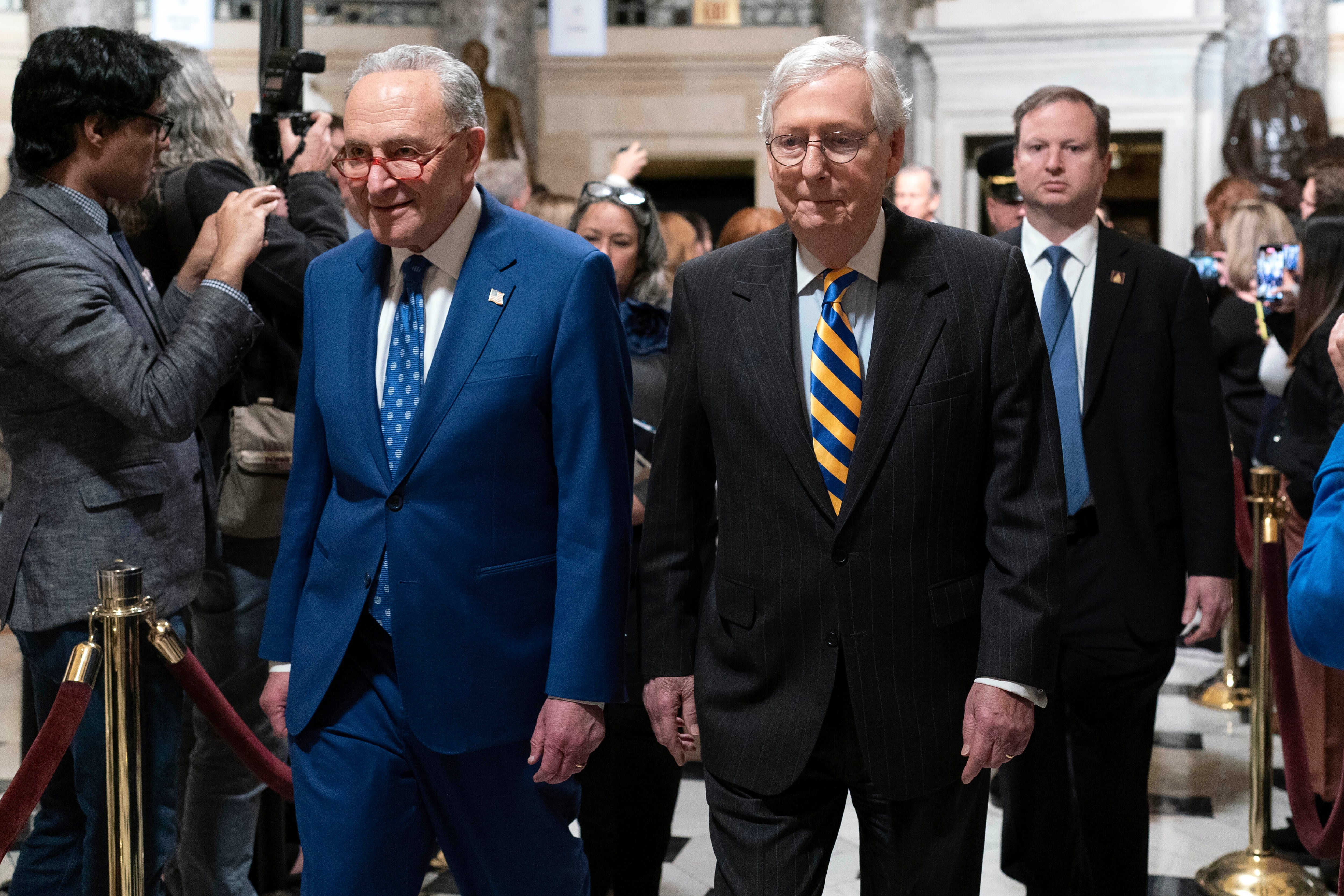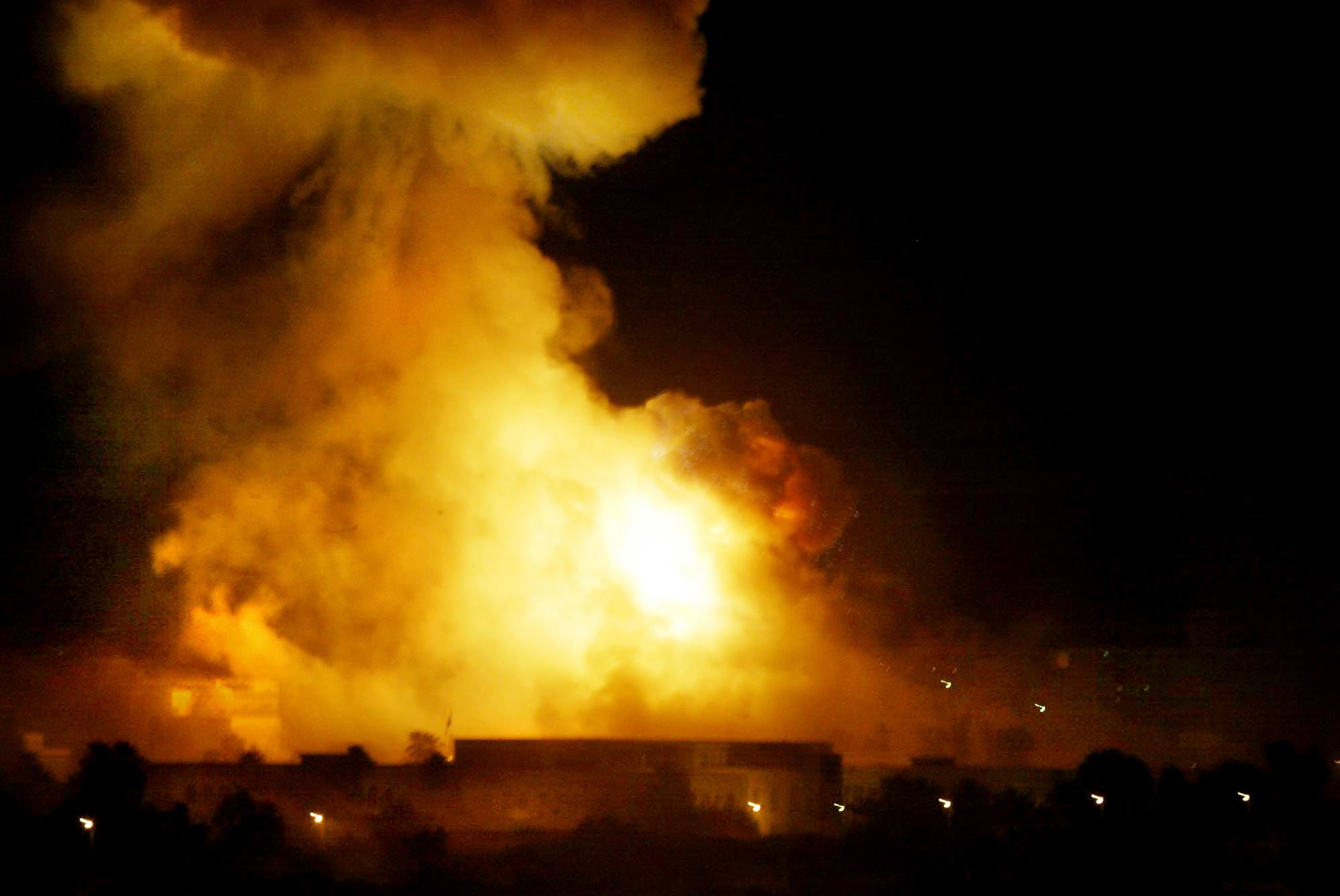WASHINGTON — Mario Marquez still carries the hardship and memories of his four deployments to Iraq with the Marine Corps between 2002 and 2009. He said he doesn’t understand why America still holds onto its military authorizations to wage war there, more than a decade after the fighting officially stopped.
“Millions of servicemen and women answered a call to serve in Iraq, willingly and without question, and we did so without ever knowing a definitive end to our service,” Marquez told reporters outside the Capitol on March 16. “However, our force is not built to remain in a perpetual state of war.”
Lawmakers took their first real steps in addressing that this week as the Senate voted 66-30 on Wednesday to repeal the authorization for use of military force it gave to former President George W. Bush 20 years ago to invade Iraq.
RELATED

It’s the first significant movement on the issue in years, and it comes just days after the 20th anniversary of the U.S. invasion of Iraq. More than 4,500 U.S. military members died there in the following decades.
The Senate’s vote to repeal of the 2002 bill — alongside a 1991 Gulf war authorization to defend Kuwait against Saddam Hussein — marks a significant milestone in congressional efforts to claw back lawmakers’ warmaking authorities from the White House, ensuring that future presidents can’t invoke them as a justification for military intervention in the Middle East.
“The enemy against whom we declared war in 1991 and [2002] is no more; Iraq is a very different nation,” said Sen. Tim Kaine, D-Va., told reporters.
Only 36% of Americans believe the U.S. was right to invade Iraq, according to an Axios/Ipsos poll conducted this month. That figure stands in stark contrast to a 2002 Pew Research survey conducted in the months before Congress’ authorization, which found 73% of Americans supported invading Iraq.
Kaine and bill cosponsor Sen. Todd Young, R-Ind., said that the move is important not just for wartime bookkeeping purposes but also to help signal a sense of completion to the millions of service members like Marquez who fought in the Middle East.
“For veterans, we have to get a sense, and a feeling that our service in country meant something,” said Marquez, now director of the American Legion’s National Security Division. “By closing these existing authorizations, it gives us that closure … a sense that our mission was worthy of our cause and our sacrifice.”
Former President Donald Trump invoked the 2002 Iraq war authorization as part of his legal justification for killing of Iranian Gen. Qasem Soleimani, then the commander of the Islamic Revolutionary Guard Corps Quds Force, via airstrike when he was traveling inside Iraq in 2020.
“Leaving outdated authorizations on the books can lead to abuse,” Kaine said. “The president should have to come to Congress to start wars, but if there’s authorizations on the books that are outdated, the president can try to torture its meaning.”
The White House has issued a statement endorsing the Kaine-Young repeal, noting that it would not affect the 2,500 U.S. troops currently stationed in Iraq.
Those troops are instead stationed there to fight Islamic State sleeper cells under a separate 2001 military authorization, which Congress passed in the wake of the 9/11 attacks to target al-Qaida in Afghanistan. Four presidents have since used the 2001 military authorization to justify more than 40 military operations in at least 19 countries across the globe, including Iraq and Syria.
RELATED

The House will still need to pass the repeal before President Joe Biden can sign it, and the path forward in the lower chamber is less clear.
House Speaker Kevin McCarthy, R-Calif., told reporters Sunday that the repeal would need to go through the Foreign Affairs Committee, “but I think it has a clear opportunity to come to the floor.”
Rep. Tom Cole of Oklahoma, who oversees the House floor as Rules Committee chairman, co-sponsored the House version of the bill.
House Foreign Affairs Chairman Mike McCaul, R-Texas, opposed previous efforts to repeal the Iraq war authorization, pointing to Trump’s strike on Soleimani and arguing that the authority can be used to go after “the Iran-sponsored terrorist groups attacking our diplomats, our soldiers, our embassy and our citizens.”
The U.S. launched retaliatory strikes on Iran-backed militias in Syria last week after a drone attack killed a U.S. contractor and wounded several troops stationed there, citing the president’s Article II self-defense authorities under the Constitution. The Iran-backed militias responded with another spate of attacks over the weekend.
“Tehran wants to push us out of Iraq and Syria,” Senate Minority Leader Mitch McConnell, R-Ky., said in a statement on Tuesday. “Why should Congress make that easier? While the Senate’s been engaged in this abstract, theoretical debate about rolling back American power, Iran has continued its deadly attacks on us.”
Leo covers Congress, Veterans Affairs and the White House for Military Times. He has covered Washington, D.C. since 2004, focusing on military personnel and veterans policies. His work has earned numerous honors, including a 2009 Polk award, a 2010 National Headliner Award, the IAVA Leadership in Journalism award and the VFW News Media award.
Bryant Harris is the Congress reporter for Defense News. He has covered U.S. foreign policy, national security, international affairs and politics in Washington since 2014. He has also written for Foreign Policy, Al-Monitor, Al Jazeera English and IPS News.




